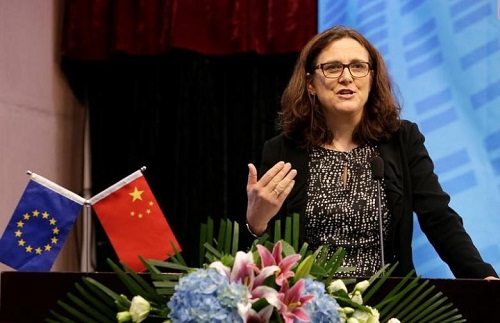Germany, France, Italy again called on the European Commission to set up a review mechanism for foreign capital acquisition, mainly aimed at China?
[Observer Network Synthesis] On May 10th, the Financial Times published an article entitled "Germany, France and Italy call on the EU to set up a review mechanism for foreign capital acquisition".
The article said that a few days ago, Germany, France and Italy once again called on the European Commission to set up a review mechanism for foreign acquisitions to curb China’s investment in European technology companies.
As early as February this year, Germany, France and Italy, the three largest economies in the euro zone, called on the EU to grant them veto power over Chinese high-tech acquisitions, and demanded stricter regulations to prevent all high-tech enterprises from falling into China’s hands.
The economic ministers of the three countries told Mammstrom, the EU Trade Commissioner, that EU countries can prevent foreign acquisitions in the name of national security, but they can also prevent acquisitions in the name of "economic reasons", that is, "additional protection based on economic standards".
In fact, a few days before Germany, France and Italy made this appeal, Mamstrom publicly stated that the EU was prepared to work with China to fight against global trade protectionism.

EU Trade Commissioner Mamstrom
Last year, many previous acquisitions between Chinese companies and European companies were blocked by European and American regulators, including China Chemical’s acquisition of Swiss agricultural giant Syngenta, Midea’s acquisition of German robot manufacturer KUKA, and China Fujian Hongxin’s acquisition of German semiconductor company Aixtron.
At the regular press conference of the Ministry of Foreign Affairs in March, Chinese Foreign Ministry spokesperson Geng Shuang responded to the statement of German Ambassador to China Ke Muxian that "the United States, Japan and many European countries believe that China’s trade protectionism tendency is on the rise".
Geng Shuang said that the essence of economic and trade cooperation between China and other countries, including Germany, is mutual benefit and win-win. In recent years, the positive progress made in Sino-German economic and trade cooperation is obvious to all, which has brought tangible benefits to the enterprises and people of the two countries and promoted the development of their respective economies.

Screenshot of the Financial Times website
The following is the full text of the Financial Times article:
Some of the largest member countries of the European Union have called for the establishment of new powers to prevent unpopular foreign acquisitions. This demand is intended to curb the investment in some of Europe’s most valued technology companies supported by the China government.
At present, Brussels has avoided this call.
Germany, France and Italy called on the European Commission to study: Should the EU be allowed to intervene in state-backed acquisitions of strategic industries? These measures are also supported by some members of the European Parliament.
The relevant authority will be similar to the Committee on Foreign Investment in the US (CFIUS), which is an inter-departmental body responsible for considering the national interests and national security impact brought by foreign investment in American enterprises.
With the support of France and Italy, the German government is increasingly concerned about the increase of investment from China in key economic sectors in Germany.
China’s worries peaked when Midea, a German manufacturer of household appliances, offered 4.5 billion euros for Kuka, a German manufacturer of industrial robots.
Although the German government struggled for a while, and German Chancellor Angela Merkel complained about the obstacles faced by German companies wishing to invest in China, the deal was completed in January this year.
Jyrki Katainen, vice-president of the European Commission, who is in charge of EU trade policy, said that although the European Commission wants to ensure that member countries are not "accidentally affected by aggressive acquisitions", it also wants to remain open to foreign investment.
"It is hard to imagine the European Commission telling company owners or entrepreneurs that you are not allowed to sell your company because you are too good," Katainen told the Financial Times.
A paper published on Wednesday on how the EU should respond to globalization suggested more discussion, but did not propose specific actions.
European Commission officials want to support free trade and attract investment. They are worried about creating a tit-for-tat situation: some countries may prevent state-controlled European enterprises from making acquisitions.
Katainen said that the EU had better continue to seek comprehensive investment reciprocity. He said: "If EU companies have the same rights as companies in other countries in acquiring enterprises, then you don’t have to worry."
He pointed out that in the case of national security concerns caused by related transactions, some member States have the right to "step on the brakes".
At present, Europe and China are discussing an enhanced investment agreement, but it is not expected to make a breakthrough soon.
Sebastian Vos, a partner of Covington, a law firm, said that if the EU had a mechanism to review and supervise foreign investment, "it would be an interesting tool in the European Commission’s toolbox, but I really wonder how often they would use it. It may be a useful tool in discussions with China or other countries, but people can see many potential shortcomings. "

In 2016, China spent more than US$ 200 billion on the acquisition of foreign enterprises, of which European enterprises accounted for more than half.
According to Dealogic, China spent more than $200 billion on acquisitions worldwide last year, more than half of which was in Europe.